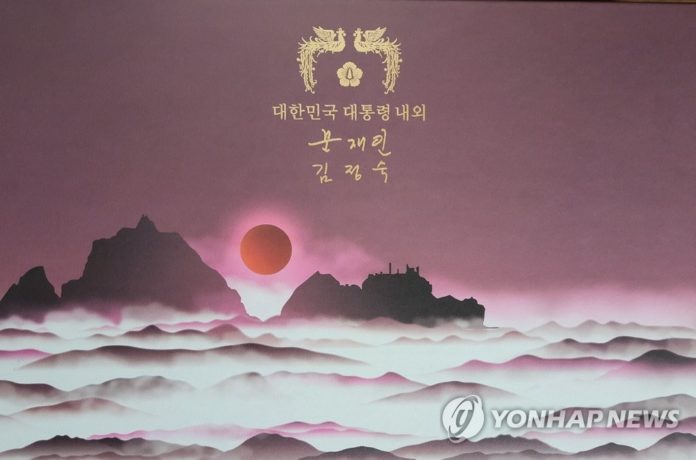The image appeared to show disputed islets
President Moon Jae-in managed to offend both Japanese and Koreans through a gift that appeared to represent disputed islets, one of the most sensitive diplomatic issues between the two countries.
South Korea is preparing for the Lunar New Year next week, which is one of the biggest holidays across East Asia. President Moon sent gifts to key officials from abroad and home. In this year’s gift package, the President included an illustration that resembles the disputed islets claimed by both Seoul and Tokyo. The illustration showed an image of islets and the sun rising. The islets are located farther east than anywhere else in South Korea, and it is considered the first location for the local sunrise.
The Japanese embassy in South Korea announced late last week that it returned the present to the presidential Blue House saying that it had an image of the disputed islets called Dokdo in South Korea and Takeshima by Japan. The embassy told the Japanese media that “Takeshima is Japan’s sovereign territory historically and in international law, and we cannot accept this.”
The Blue House appears to be trying not to make an official comment on the matter, including whether the illustration was meant to signify Dokdo. However, it reiterated that “Dokdo is South Korea’s sovereign territory historically and geographically.”
On Tuesday, the Blue House also confirmed that some correspondents from the Japanese media stationed in South Korea also returned the present. An official from the Blue House told the media that several Japanese correspondents expressed that they would like to return the gift but said that “it is hard to confirm the exact number of correspondents who expressed this or whether some presents were actually returned.”
When asked about the official stance regarding Japanese correspondents returning the gift, the official said, “I don’t have anything to respond.”
The gift box, which contained honey, traditional liquor, and other local food products, was sent to some 15,000 people including to all embassies ahead of the Lunar New Year holiday.
South Korean politicians, both conservative and liberal, are staying silent on this issue. They likely sense that commenting from either perspective will inflame the public over this sensitive issue.
On the internet, however, it has been a hot topic for a few days now, where there are hundreds of comments posted on many articles. Some people criticize the government for playing childish politics ahead of the holiday and election. Others blame the Japanese embassy and correspondents for overreacting to the customary present.
In the press, many editorials are attacking Japan’s stance. In one example, the Hankook Ilbo newspaper ran an editorial on Monday titled, “Japanese embassy that refused President Moon’s present saying ‘Dokdo is drawn.’” The editorial read that Japan’s overreaction was regretful and it’s making an issue of something that it does not have to. It said that the red sun rising above the Dokdo islets reminded the South Korean people of the Japanese national flag and said that it does not understand why it is Japan who feels uncomfortable.
However, the editorial also said the Blue House should have been more careful before sending out the present and that it gave Japan a reason to attack South Korea. It pointed out that it is not the first time that the two countries had a conflict over a diplomatic gift.
In 2018, then-Japanese Prime Minister Shinzo Abe presented Moon with a strawberry cake to commemorate his first anniversary in office during Moon’s visit to Tokyo. At that time, Moon refused to eat it, saying “I have bad teeth,” creating an awkward moment.
The editorial argued that the two countries should learn from these lessons.
Meanwhile, the Ministry of Culture, Sports and Tourism released a report on how people abroad think about South Korea on Monday after surveying 12,500 people living in 24 countries.
In this year’s survey, the rate of Japanese people who see South Korea positively was 35 percent, which rose from 27.6 percent recorded last year. This was the first time since this survey was first conducted in 2018 that the figure surpassed the figure of those who see South Korea negatively (26.6 percent).
The negative sentiment among Japanese peaked in 2019 when the figure recorded 53.2 percent. At that time, the biggest reason why they viewed South Korea negatively was due to the anti-Japanese sentiment. At that time, the anti-Japanese sentiment rose ahead of the 2020 general election.
President Moon and leftists have portrayed conservatives in South Korea as pro-Japanese representatives of “deep-rooted evils” who should be removed from the country. They use this anti-Japan sentiment to solidify their support during election periods.


